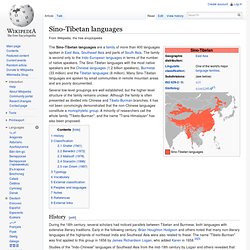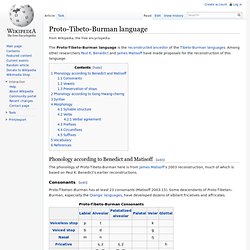

Sino-Tibetan languages. The Sino-Tibetan languages are a family of more than 400 languages spoken in East Asia, Southeast Asia and parts of South Asia.

The family is second only to the Indo-European languages in terms of the number of native speakers. The Sino-Tibetan languages with the most native speakers are the Chinese languages (1.2 billion speakers), Burmese (33 million) and the Tibetan languages (8 million). Many Sino-Tibetan languages are spoken by small communities in remote mountain areas and are poorly documented. Several low-level groupings are well established, but the higher-level structure of the family remains unclear. Although the family is often presented as divided into Chinese and Tibeto-Burman branches, it has not been convincingly demonstrated that the non-Chinese languages constitute a monophyletic group. History[edit] During the 18th century, several scholars had noticed parallels between Tibetan and Burmese, both languages with extensive literary traditions. Paul K. Classification[edit]
Sinitic languages. Proto-Tibeto-Burman language. The Proto-Tibeto-Burman language is the reconstructed ancestor of the Tibeto-Burman languages.

Among other researchers Paul K. Benedict and James Matisoff have made proposals for the reconstruction of this language. Phonology according to Benedict and Matisoff[edit] The phonology of Proto-Tibeto-Burman here is from James Matisoff's 2003 reconstruction, much of which is based on Paul K. Benedict's earlier reconstructions. Consonants[edit] Proto-Tibetan–Burman has at least 23 consonants (Matisoff 2003:15). Proto-Tibeto-Burman also has many final nasals, stops, and liquids. Vowels[edit] Proto-Tibeto-Burman vowels can be split into primary and secondary sets. Matisoff (2003) reinterprets diphthongs from Paul Benedict's reconstruction as long vowels. Preservation of stops[edit] Sino-Tibetan languages go through a series of four stages in which final stops and nasals gradually decay (Matisoff 2003:238-239).
The six final stops and nasals, *-p, *-t, *-k, *-m, *-n, *-ŋ, are all intact. Syntax[edit]